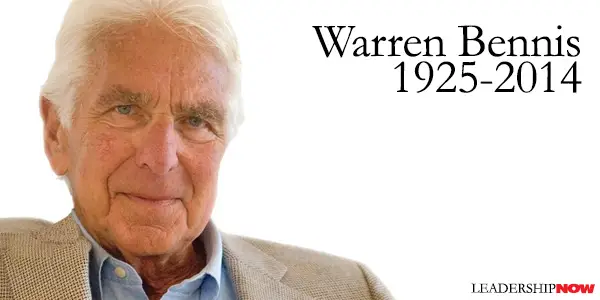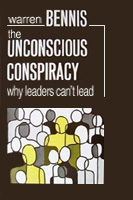 |
 |
08.04.14

Warren Bennis 1925-2014
THE father of leadership, Warren Bennis died Thursday, July 31 at the age of 89. He had served as a business professor at the University of Southern California for the last 35 years. He wrote nearly 30 books including An Invented Life, which earned him a Pulitzer Prize nomination. His leadership thinking was in many ways ahead of its time. I first met Warren Bennis through his book, The Unconscious Conspiracy: Why Leaders Can’t Lead, in 1976. Later it was revised and reprinted as Why Leaders Can't Lead: The Unconscious Conspiracy Continues. He sparked my interest then and there in the discipline of leadership. In that first book he explained that the real enemy to leadership is apathy. Our organizations, he wrote, are “afflicted with a threefold sense of loss: loss of community, loss of purpose, and loss of power.” The core of the problem is that our leaders weren’t and still aren’t leading. “They’re consulting, pleading, temporizing, martyrizing, trotting, putting out fires, either avoiding or taking the heat, and spending too much energy in doing both.” Although he said that leaders must also manage, they are spending too much time managing.  Bennis was always willing to—even interested in—taking the time to help you shape your thinking. His insights have shaped my own in many ways. More from Warren Bennis: “Too many companies believe people are interchangeable. Truly gifted people never are. They have unique talents. Such people cannot be forced into roles they are not suited for, nor should they be. Effective leaders allow great people to do the work they were born to do.” Taking charge of your own learning is a part of taking charge of your life, which is the sine qua non in becoming an integrated person.” “The most dangerous leadership myth is that leaders are born — that there is a genetic factor to leadership. This myth asserts that people simply either have certain charismatic qualities or not. That's nonsense; in fact, the opposite is true. Leaders are made rather than born.” “When the trust and credibility of leaders are at their lowest, when the beleaguered survivors in leadership positions feel unable to summon up the vestiges of power left to them, we most need people who can lead.” Bennis was a remarkable man with well-developed insights
Posted by Michael McKinney at 07:36 PM
|
BUILD YOUR KNOWLEDGE
 

How to Do Your Start-Up Right STRAIGHT TALK FOR START-UPS 
Grow Your Leadership Skills NEW AND UPCOMING LEADERSHIP BOOKS 
Leadership Minute BITE-SIZE CONCEPTS YOU CAN CHEW ON 
Classic Leadership Books BOOKS TO READ BEFORE YOU LEAD |